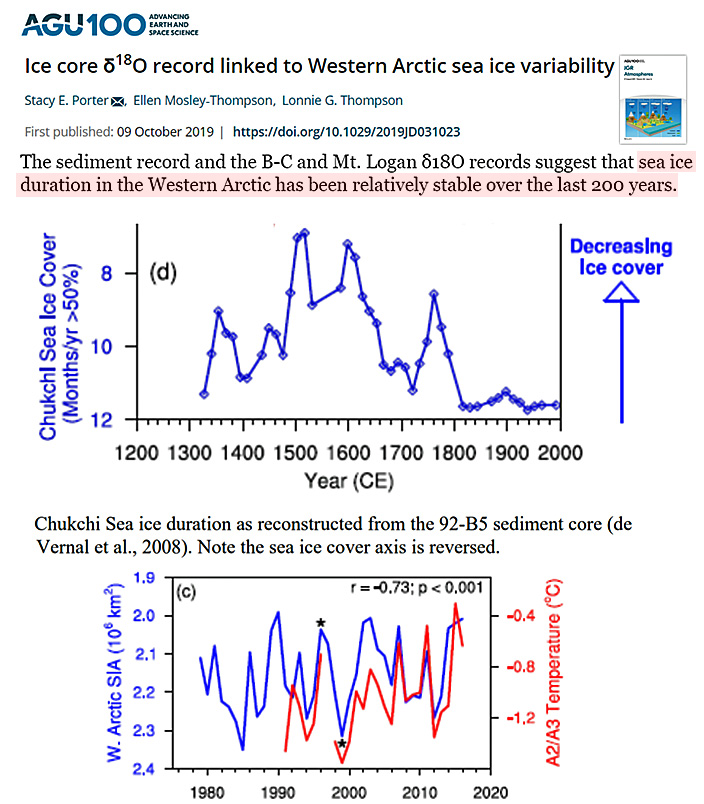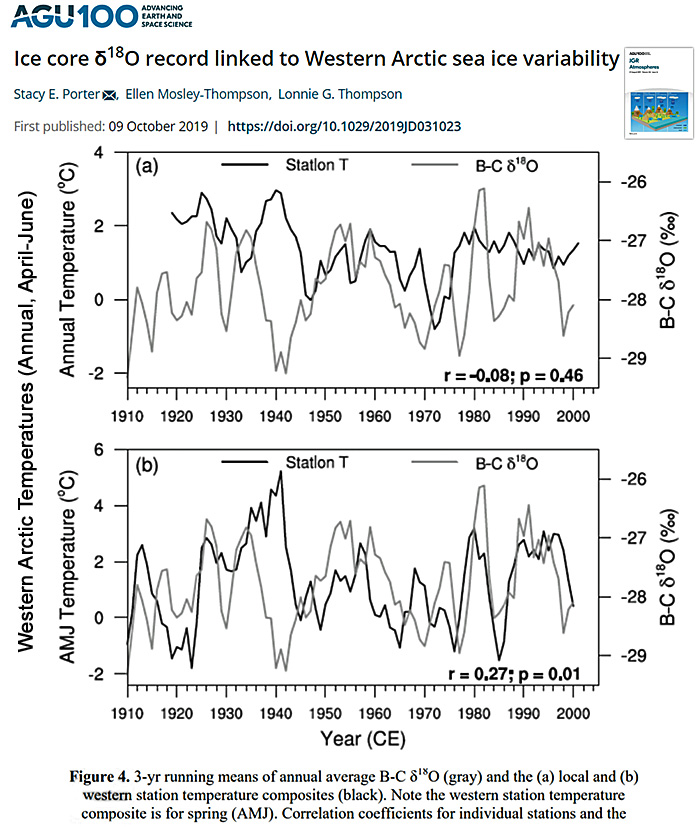A new 800-year reconstruction of Western Arctic Ocean sea ice variability (Porter et al., 2019) indicates the recent centuries (and decades) of sea ice coverage are the most extensive of the period, with no significant net change in the last 200 years.
There was no ice cover in the Western Arctic for about 2 to 5 months of the year during the Little Ice Age (1500s-1700s C.E.).
Since 1800, the Western Arctic has only been free of ice cover for less than 1 month of the year.

Image Source: Porter et al., 2019
The study region in the Western Arctic was warmer than recent decades during the 1930s according to data from temperature stations.






“There was no ice cover in the Western Arctic for about 2 to 5 months of the year during the Little Ice Age (1500s-1700s C.E.).
Since 1800, the Western Arctic has only been free of ice cover for less than 1 month of the year.”
There is that apparent paradox again. With the recent article here on Arctic horses in the Paleolithic it is even more blatant.
Can climatologists deal with this? At first glance the ice went somewhere else on land, meaning water locked-up there.
This supports my pet theory that climate change is a result of UV intensity. Under a quiet sun the UV decreases, the stratosphere shrinks, the Brewer-Dobson circulation slows, the winter polar vortex weakens or disappears so that: warm air enters the arctic, cold arctic air flows southward, resulting in the “Little Ice Age” or perhaps the Dalton Minimum or one of the other cooler periods.
There was an article here not too long ago on the Younger Dryas chaotic temperature swings at the Arctic (linked to the new Greenland impact crater discovery). Would that have drastically altered Arctic circulation?
I believe the Younger Dryas was not a period of cooling, it was a period of rapid warming terminating a glaciation. The large meltwater pulse blanketed the North Atlantic with two results. First, the thermohaline circulation shut down. I think the article you refer to documents this. Second, the meltwater was depleted in O18 so that when it evaporated and became further depleted in O18, then snowed out on Greenland, it caused a false indication of cooling in the ice cores.
pochas94,
Your ‘pet theory’ thoughts are remarkably similar to mine own. I wonder how many more people are thinking about this and how the LIA started?
[…] of the Climate Game Antarctic Ice Cliffs May Not Contribute To SLR As Much As Predicted New Paper: West Arctic Sea Ice ‘Relatively Stable’ Since 1800s… No Time for Climate at the Democrat Debate American ‘Gains’ to Reduce Pollution ‘Offset’ by […]
[…] https://notrickszone.com/2019/10/24/new-paper-west-arctic-sea-ice-relatively-stable-since-1800s-much… […]
[…] https://notrickszone.com/2019/10/24/new-paper-west-arctic-sea-ice-relatively-stable-since-1800s-much… […]
[…] New Paper: West Arctic Sea Ice ‘Relatively Stable’ Since 1800s…Much Less Ice Cover… […]
[…] New Paper: West Arctic Sea Ice ‘Relatively Stable’ Since 1800s…Much Less Ice Cover… […]
[…] of the Climate Game Antarctic Ice Cliffs May Not Contribute To SLR As Much As Predicted New Paper: West Arctic Sea Ice ‘Relatively Stable’ Since 1800s… No Time for Climate at the Democrat Debate American ‘Gains’ to Reduce Pollution ‘Offset’ by […]